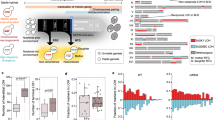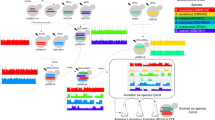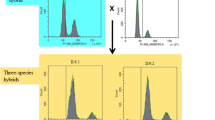Abstract
IF M denotes a gene for the production of maltase and m its allelomorph, which is unable to produce the enzyme, a heterozygotic 4-spored yeast ascus originally having the formula Mm would be expected to yield a simple Mendelian segregation ratio of 2 : 2; that is, two of the spores should give rise to maltose-fermenting types, while the other two spores should give rise to non-fermenting types.
This is a preview of subscription content, access via your institution
Access options
Subscribe to this journal
Receive 51 print issues and online access
$199.00 per year
only $3.90 per issue
Buy this article
- Purchase on Springer Link
- Instant access to full article PDF
Prices may be subject to local taxes which are calculated during checkout
Similar content being viewed by others
References
Winge, Ö., and Roberts, C., C.R. Lab. Carlsberg, Sér. Physiol., 24, 263 (1948).
Winkler, H., “Die Konversion der Gene”, (1930).
Lindegren, C. C., “The Yeast Cell, its Genetics and Cytology” (1949).
Author information
Authors and Affiliations
Rights and permissions
About this article
Cite this article
WINGE, Ö., ROBERTS, C. Non-Mendelian Segregation from Heterozygotic Yeast Asci. Nature 165, 157–158 (1950). https://doi.org/10.1038/165157b0
Issue Date:
DOI: https://doi.org/10.1038/165157b0
This article is cited by
-
Genetische Untersuchungen �ber das Paarungstypverhalten bei Saccharomyces und die Maltose-Gene einiger unterg�riger Bierhefen
Archiv f�r Mikrobiologie (1962)
-
Über das Erbverhalten eines Backhefe-Stammes (Saccharomyces cerevisiae)
Der Züchter (1959)
-
Somatische Konversion beiLycopersicon esculentum Mill
Zeitschrift f�r Vererbungslehre (1958)
-
Gene segregation in autotetraploids. II
The Botanical Review (1958)
-
Genetical analysis of the clones from a single tetrad of saccharomyces showing non-Mendelian segragation
Genetica (1957)
Comments
By submitting a comment you agree to abide by our Terms and Community Guidelines. If you find something abusive or that does not comply with our terms or guidelines please flag it as inappropriate.



